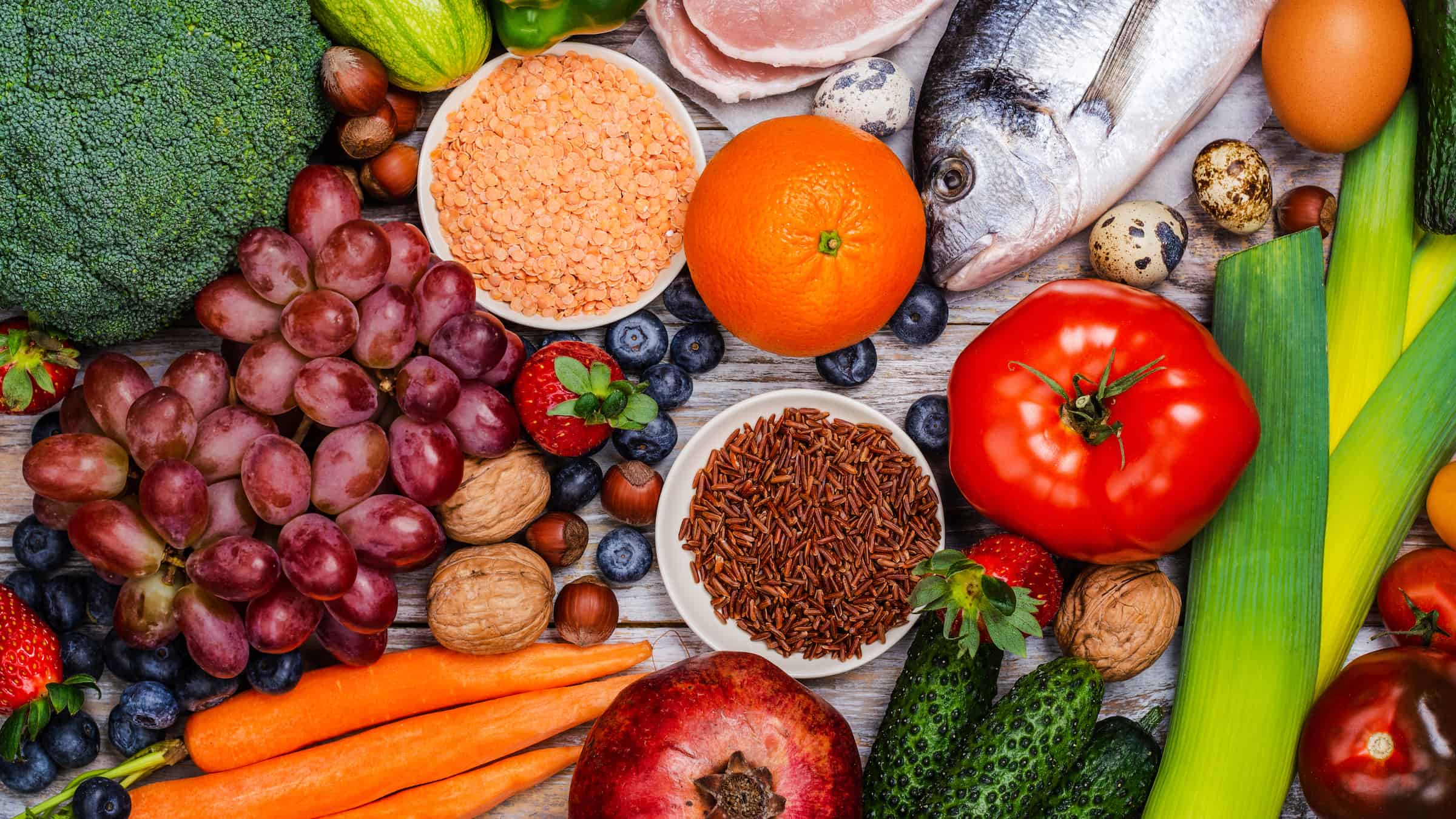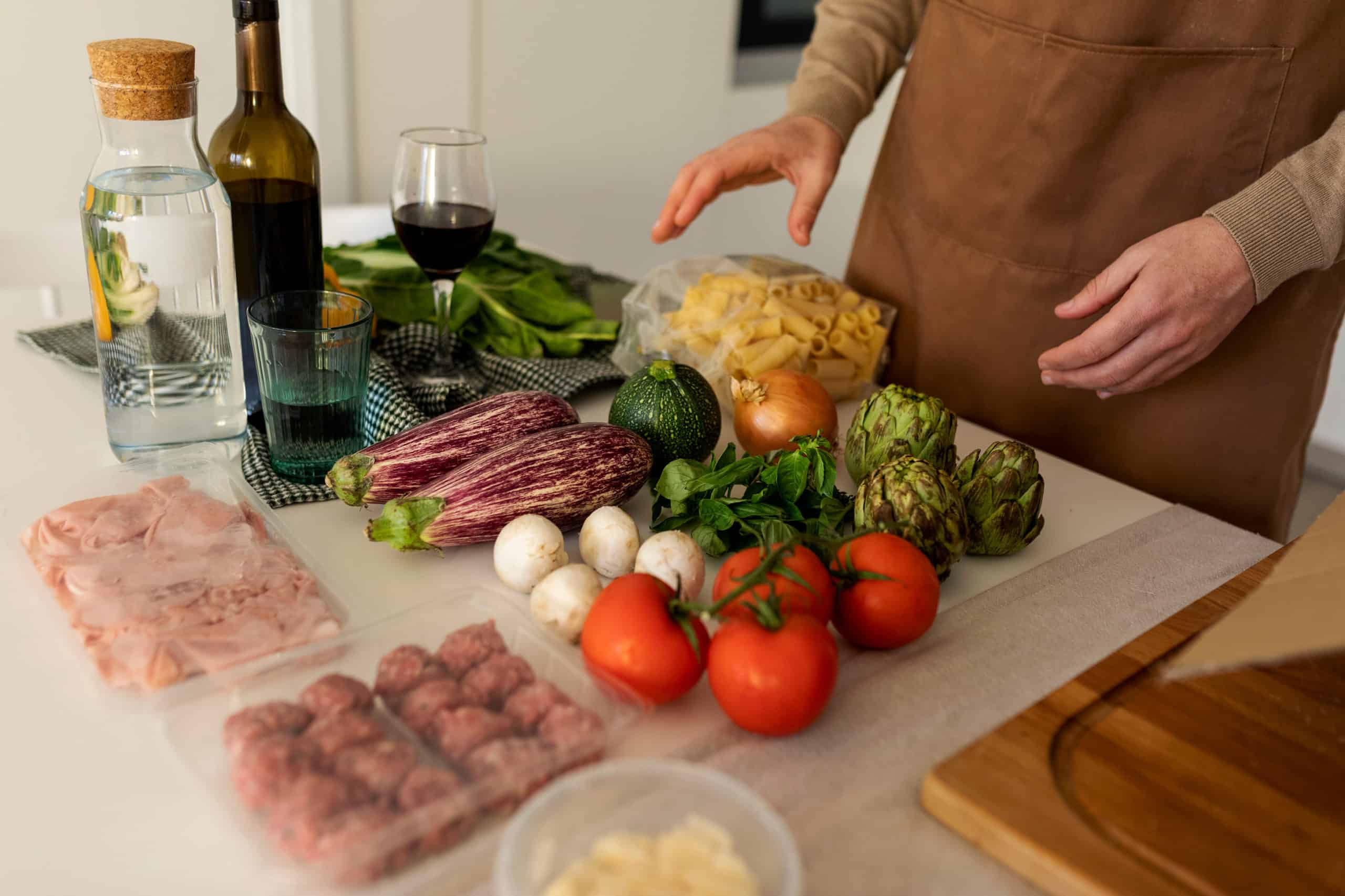- The Mediterranean diet works for weight loss, but what and how much you eat determines your success.
- Fruits, veggies, whole grains, and fish are all important Mediterranean diet-friendly foods for weight loss.
- Lifestyle changes, like food logging and exercise, are key to reaching your wellness goals.
The Mediterranean diet isn’t just another fad diet. It’s a popular weight loss approach that studies show works for many people.
Emphasizing fruits, vegetables, whole grains, lean protein sources, and healthy fats, the Mediterranean diet is a balanced way of eating. There are no strict guidelines, and no foods are completely off the table.
To get expert answers about the Mediterranean diet for weight loss, we talked to Noom coach Ashley Bannister, MS, RDN. Read on for her thoughts.
Note: Consult your health care provider before making any dietary changes.
Can you lose weight on the Mediterranean diet?
The short answer is yes, research suggests that you can lose weight on the Mediterranean diet.
However, like any approach to eating, following the Mediterranean diet alone doesn’t automatically mean you’ll see progress on the scale.
“The Mediterranean diet can be effective for weight loss, as it focuses on building your meals around fruits and vegetables, healthy fats, and lean protein,” Bannister says.
One systematic review analyzed the effects of the Mediterranean diet on long-term weight loss. The average weight loss for participants was about 9 to 22 pounds in one year.
And another study found that the Mediterranean diet can help with long-term weight loss maintenance.
In addition to the research, there are also many stories out there of people who’ve achieved their weight loss goals with the Mediterranean diet, alongside exercise and other lifestyle changes.
Real results with a personalized weight loss program
Take the quiz!

But ultimately, what and how much you’re eating plays an important role in whether you’ll see the progress you’re aiming for on the scale.
“Overall calorie balance is important,” Bannister explains. You’ll need to be burning more calories than you take in to lose weight.
How much weight can you lose following the Mediterranean diet?
“There is no one set number,” Bannister says.
Weight loss results on the Mediterranean diet will depend on a number of factors, including age, sex, height, current weight, activity level, and genetics.
The U.S. Centers for Disease Control and Prevention (CDC) recommends gradual weight loss of 1 to 2 pounds per week. Bannister agrees that this is the healthiest rate of weight loss for most people to aim for.
But don’t forget to talk to your doctor to choose weight loss goals that are right for your body.
Can you lose weight fast on the Mediterranean diet?
“Generally speaking, we don’t recommend losing more than 2 pounds per week on any diet, in order for the weight loss to be sustainable long term,” Bannister says.
The Mediterranean diet isn’t a magic pill for fast weight loss. And at Noom, we recommend focusing on losing weight in a sustainable way, not losing weight as quickly as possible.
“Overly fast weight loss is often unsustainable,” Bannister adds, “as you’re typically making unsustainable changes to get there.”
What kind of food do you eat on the Mediterranean diet for weight loss?
The Mediterranean diet is made up of many nutritious foods that Bannister says are great for weight loss—like fruits, vegetables, whole grains, and fish.
“The emphasis on whole foods and minimal processed foods and sweets leads to a balanced way of eating that is diet-friendly,” she says.
These are the foods Bannister suggests if you’re trying to lose weight:
Fruits
If you love fruit, you’re in luck. Fruits are a key part of the Mediterranean diet (and weight loss). And at Noom, we’re big fans of fruit.
In fact, research shows that fruits can promote satiety as they have a lower caloric density (fewer calories in a food portion).
Moreover, studies suggest a link between increasing your fruit intake and weight loss, as it helps reduce your overall calorie intake.
Bannister recommends that you eat fruit daily on the Mediterranean diet, whether that’s eating grapefruit with your morning coffee or adding a bunch of grapes to your snack time.
Vegetables
Vegetables are another staple of the Mediterranean diet, Bannister says. And at Noom, we highly encourage getting lots of veggies in your diet.
If you want to lose weight, vegetables play an important role in achieving your goals.
Research indicates that low-calorie-dense foods like vegetables boost feelings of fullness and could lead to weight loss.
And like fruit, Bannister’s guidance is to consume vegetables throughout each day.
Get in your daily dose of veggies by chopping up cucumbers for a lunchtime Greek salad or roasting up bell peppers to go with your baked salmon at dinner.
Whole grains
Whole grains—like whole wheat bread and brown rice—also make up an important part of the Mediterranean diet and help with weightmanagement.
Bannister notes that whole grains are a good source of fiber, which research suggests can help promote weight loss and lower body mass index.
Whole grains are another food group you’ll want to eat from daily, says Bannister. Think foods like overnight oats and whole wheat pasta salad, or try out one of these delicious pasta recipes.
Fish
According to Bannister, fish is readily accessible along the Mediterranean Sea—making it a go-to lean protein source for the Mediterranean diet.
In addition to being rich in omega-3s, research suggests that fish is a high-protein, low calorie-density food that can help increase satiety, control the appetite, and regulate blood sugar.
Bannister recommends that you eat fish at least twice a week. And that should be easy to do with delicious (and healthy) options like salmon tabbouleh salad and Mediterranean tuna steaks.
How to lose weight on the Mediterranean diet: 6 tips
If you’re trying to lose weight on the Mediterranean diet, Bannister has several tips that can help.
1. Learn about the emotional side of weight loss
It’s hard to change habits holding you back from weight loss, without first uncovering the root causes behind these behaviors.
“Part of the key to success with any diet is learning more about the ‘why’ behind your eating habits and creating strategies to navigate those triggers,” Bannister explains. “The same is true with the Mediterranean diet.”
Think about how you cope when you’re upset. Do you turn to a pint of gelato in the freezer for comfort?
Well, there’s a reason for that. Research suggests that the carbs in each spoonful may help cheer you up.
“We all experience stress, sadness, happiness, fatigue, boredom, and a whole spectrum of emotions,” Bannister says. “It can be easy to turn to food as a coping mechanism for these emotions, regardless of what diet you’re following.”
The good news? There are lots of great emotional comfort foods within the Mediterranean diet, like whole-grain bread, grilled veggies, and wine.
But there are also other things you can do to feel better instead.
Spend an afternoon at the beach and watch the sunset. Go out dancing with your friends. Immerse yourself in the activities that make you feel happy.
And if you need that gelato every once in a while, don’t beat yourself up. It’s not the end of the world. Enjoy your scoop of joy and try again tomorrow.
2. Lean into family tradition and heritage
Another tip that may help you lose weight with the Mediterranean diet is to tap into your heritage and family traditions.
If you have any family or ancestors from Spain, Italy, Greece, or even Northern Africa, the foods of these seaside regions may carry special meaning.
Connecting with a healthy, traditional diet can be empowering and help you with your goals.
Perhaps you don’t have family roots in line with the diet, but just love these regions and their cuisine. That’s a great way to motivate yourself to stick to this eating style, too.
3. Aim for a healthy calorie deficit
To lose weight, your body has to burn more calories than it takes in.
This is true no matter what diet you’re on, including the Mediterranean diet. You have to be in a calorie deficit to see progress on the scale.
But the ideal calorie deficit will vary by person. So it’s important to talk to your doctor, registered dietitian, or nutritionist to find out what that should look like for you.
Tell your medical provider you are on the Mediterranean diet and ask for ideas on maintaining a calorie deficit as well.
We also have a calorie deficit calculator that uses age, sex, weight, height, and activity level to give you an idea of what to aim for.
Keep in mind that your calorie deficits should be realistic. Avoid trying to cut out entire food groups to achieve a larger deficit. This can make a calorie deficit hard to stick with.
Choose a healthy calorie deficit that will be sustainable long term—not one that is overly restrictive and will only work for a few weeks.
4. Make balanced food choices based on caloric density
Unlike other popular diets, the Mediterranean diet isn’t restrictive when it comes to food, which is why we love it at Noom.
However, the right balance of calories across foods is key, so it’s important to take caloric density into account.
“Luckily, the Mediterranean diet emphasizes low calorie-dense foods, like fruits and vegetables, which will help to maintain a calorie deficit while remaining satiated,” Bannister explains.
With that in mind, Bannister recommends filling up on fruits and veggies—while watching your portions of foods with higher calorie density, like red meat, sweets, processed foods, and healthy fats, like olive oil.
Bannister says a helpful way to stay on track is by planning meals and snacks in advance and limiting convenience foods.
But remember, no foods are off limits on the Mediterranean diet. And we at Noom believe the same. We don’t label foods as “good” or “bad”—they just need to be eaten in a balanced way.
So if you’re worried about indulging in that Italian tiramisu you’ve been craving, remember there’s no need to give up any of the foods you love entirely. Just aim for moderation.
5. Log your food intake each day
The Mediterranean diet is more of a lifestyle than a strictly, laid-out plan you follow, Bannister says.
That said, it’s easy to lose track of how much you’re actually eating. Food logging can help with that challenge.
“It’s still possible to overdo it on the Mediterranean diet and consume more calories than your body needs,” Bannister says. “Logging your food can help to keep you on track and accountable to your goals.
In fact, research indicates a link between logging your food and weight loss.
Bannister points out that food logging gives you a greater awareness of the food choices you’re making.
“It can show you the areas that you are doing well in and the areas that you need to improve upon when following the Mediterranean diet,” she says.
And you always know how much you’re eating at any given time, so you can adjust portion sizes accordingly.
A food logging app—like Noom Weight—makes it easy to track food intake.
Noom takes factors like your weight and activity level into account to generate a daily calorie goal tailored to your body. After that, you just log your meals for the day, and the app will keep track of how many calories you have left, so you stay within your specified calorie range.
6. Add joyful movement into your daily routine
Physical activity is important to the culture behind the Mediterranean diet.
Bannister recommends staying active alongside following a Mediterranean diet to help you reach your health goals.
At Noom, we believe the key to being active is to work it into your daily routine gradually.
Don’t go for the high-intensity exercise right away if that’s not something you’re comfortable with. Choose a physical activity level that feels right for your body, and don’t overdo it.
Maybe that means getting in 200 extra steps for the day. (Noom Weight’s built-in pedometer can help you track that.)
Then, little by little, your walks become jogs, or you switch to a higher-intensity activity like biking or swimming.
Whatever you do, take part in activities you’ll actually enjoy.
And don’t forget to keep track of your exercise, so physical activity becomes a regular part of your day. (Noom Weight’s fitness tracker can help with that, too.)
Reflection exercise
Think about your current eating habits. What’s one change you might have to make to eat more in line with a Mediterranean diet?
Write it down, or note it on your smartphone. Later, when you have a moment, come back and ask yourself how you can make that change.
What Mediterranean diet recipes for weight loss can help?
With any new eating approach, it’s hard to know where to start with cooking meals that will support your weight-loss goals.
To help you out, we’ve rounded up a few balanced, nutrient-dense Mediterranean diet recipes from Italy, Greece, and beyond for each meal of the day.
Breakfast recipes to kick your day off right
Start the day with balanced breakfast options that are rich in flavors of the Mediterranean. These dishes will leave you energized and ready for the day ahead.
Egg sandwiches with rosemary, tomato, and feta from EatingWell (242 calories per serving)
Balsamic berries with honey yogurt from Kitchn (111 calories per serving)
Salmon cake Eggs Benedict with lemon hollandaise and crispy capers from Every Last Bite (433 calories per serving)
Lunch recipes to satisfy your mid-day hunger
Say goodbye to the same old boring sandwiches for lunch. Bring some excitement back into lunchtime with simple yet mouth-watering Mediterranean diet dishes.
Spinach and feta turkey meatballs with herbed quinoa from EatingWell (392 calories per serving)
Mediterranean white bean soup from Kitchn (426 calories per serving)
Falafel salad from A Couple Cooks (284 calories per serving)
Dinner recipes for a healthy end to the day
It’s easier to get motivated to cook dinner when you’re able to get more creative in the kitchen—without being overwhelmed by complex recipes.
These easy dinner ideas are perfect for busy weeknights while still incorporating scrumptious ingredients you’ll love.
Grilled scallops with farro and plum salad from Food Network (470 calories per serving)
Slow-cooker Mediterranean diet stew from EatingWell (191 calories per serving)
Pistachio-crusted salmon from Ahead of Thyme (221 calories per serving)
Dessert recipes for a dose of your favorite sweet treats
Yes, I know we said to limit sweets on the Mediterranean diet, but it’s perfectly fine to indulge in sweet treats in moderation. And these desserts are sure to satisfy your sweet tooth.
Popped quinoa crunch bars from The Garlic Diaries (170 calories per serving)
Sour cream and berries brûlée from Kitchn (172 calories per serving)
Spiced roasted fruit from Better Homes and Gardens (273 calories per serving)
Snack recipes to get you through the day
On the Mediterranean diet, you have so many fresh fruit and veggie options to snack on. And, of course, there’s hummus with pita chips.
But if you want to try something different for a quick energy boost, these recipes are for you.
Date wraps from EatingWell (35 calories per serving)
Dry-roasted chickpeas from Allrecipes (105 calories per serving)
Citrus marinated olives from Food Network (180 calories per serving)
What Mediterranean diet for weight loss meal plan is best?
Recipes are a good start when you’re new to the Mediterranean diet. But maybe you want a meal plan that maps out everything for you in a way that will jump-start your weight loss.
Sometimes, it’s just easier to start a diet when you know exactly what to eat at each meal during the first few weeks.
Our Mediterranean diet plan is crafted to offer you the best balance and diverse options that are both healthy and tasty. You’ll be on your way to meeting your wellness goals in no time.
Real results with a personalized weight loss program
Take the quiz!

Use Noom to guide you on your Mediterranean diet weight loss journey
With minimal restrictions and a balanced eating approach, it’s no surprise that the Mediterranean diet is so popular for weight loss.
At Noom, we’re on board. That’s because we believe in healthy eating in a sustainable way—like the Mediterranean diet encourages.
Because of this alignment, Noom is a perfect weight loss program to work alongside the Mediterranean diet and help you reach your goal weight. See how Noom complements the Mediterranean diet for yourself.



